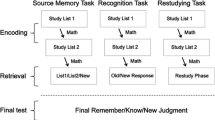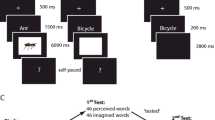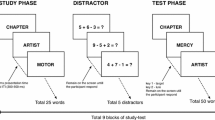Abstract
Rationale
In Koriat’s accessibility model (Koriat, Psychol Rev, 100:609–639, 1993; Koriat, J Exp Psychol Gen, 124:311–333, 1995), when a person fails to recall a required target, he or she can nevertheless provide some partial information about the target. Moreover, individuals are able to provide feeling-of-knowing (FOK) judgments about the availability of the target in memory. The cues for the FOK evaluations reside in the products of the retrieval process itself. It was shown that the benzodiazepine lorazepam drug induces some impairment of memory.
Objectives
The effects of the amnesic benzodiazepine lorazepam on the total and partial recall of recently learned material and on FOK ratings were investigated in healthy volunteers.
Methods
Twenty-eight healthy volunteers participated in the study: 14 of these received a capsule containing lorazepam (0.038 mg/kg) and 14 a placebo capsule. The material to be learned consisted of four-letter nonsense tetragrams with each letter providing partial information with regard to the four-letter target (Koriat, Psychol Rev, 100:609–639, 1993).
Results
The number of incorrect letters reported was higher for the lorazepam than for the placebo condition. The FOK magnitude was higher for the placebo participants than for the lorazepam participants. The predictive value of FOK for recognition was preserved by the drug.
Conclusion
When studying four-letter nonsense letter strings, lorazepam participants present an impairment of episodic short-term memory and the drug has an effect on FOK estimates but not on the predictive accuracy of the FOK. The accessibility hypothesis of FOK was confirmed in this study and seems to retain some validity even under the effect of an amnesic drug.
Similar content being viewed by others
References
Allen D, Curran HV, Lader M (1993) The effects of single doses of CL 284, 846, lorazepam, and placebo on psychomotor and memory function in normal male volunteers. Eur J Clin Pharmacol 45:313–320
Bacon E, Danion JM, Kauffman-Muller F, Schelstraete MA, Bruant A, Sellal F, Grange D (1998) Confidence level and feeling of knowing for episodic and semantic memory: an investigation of lorazepam effects on metamemory. Psychopharmacology 138:318–325
Bishop K, Curran V (1998) An investigation of the effects of benzodiazepine receptor ligands and of scopolamine on conceptual priming. Psychopharmacology 140:345–353
Blin O, Simon N, Jouve E, Habib M, Gayraud D, Durand A, Brugerolle B, Pisano P (2001) Pharmacokinetic and pharmacodynamic analysis of sedative and amnesic effects of lorazepam in healthy volunteers. Clin Neuropharmacol 24:71–81
Bond A, Lader M (1974) The use of analog scales in rating subjective feelings. Br J Med Psychol 47:211–218
Brown J, Lewis V, Brown M, Horn G, Bowes JB (1982) A comparison between transient amnesias induced by two drugs (diazepam or lorazepam) and amnesia of organic origin. Neuropsychologia 20:55–70
Buffett-Jerrott SE, Stewart SH (2002) Cognitive and sedative effects of benzodiazepine use. Curr Pharm Des 8:45–58
Costermans J, Lories G, Ansay C (1992) Confidence level and feeling of knowing in question answering: the weight of inferential processes. J Exper Psychol Learn Mem Cogn 18:142–150
Curran HV (1991) Benzodiazepines, memory and mood: a review. Psychopharmacology 105:1–8
Curran HV (1999) Effects of anxiolytics on memory. Hum Psychopharmacol 14:72–79
Curran HV (2000) Psychopharmacological approaches to human memory. In: Gazzaniga MS (ed) The new cognitive neurosciences, 2nd edn. MIT Press, Boston, pp 797–804
Curran HV, Schiwy W, Lader M (1987) Differential amnesic properties of benzodiazepines: a dose–response comparison of two drugs with similar elimination half-lifes. Psychopharmacology 92:358–364
Curran HV, Gardiner JM, Java RI, Allen D (1993) Effects of lorazepam upon recollective experience in recognition memory. Psychopharmacology 110:374–378
Danion JM (1994) Drugs as tools for investigating memory. Eur Neuropsychopharmacol 4:179–180
Danion JM, Zimmermann MA, Willard-Schroeder D, Grangé D, Singer L (1989) Diazepam induces a dissociation between explicit and implicit memory. Psychopharmacology 99:238–243
Danion JM, Peretti S, Grange D, Bilik M, Imbs JL, Singer L (1992) Effects of chlorpromazine and lorazepam on explicit memory, repetition priming and cognitive skill learning in healthy volunteers. Psychopharmacology 108:345–351
Duka T, Redemann B, Voet B (1995) Scopolamine and lorazepam exert different patterns of effects in a test battery assessing stages of information processing. Psychopharmacology 119:315–324
Duka T, Curran HV, Rusted JM, Weingartner HJ (1996) Perspectives on cognitive psychopharmacology research. Behav Pharmacol 7:401–410
Ferrara SD, Giorgetti R, Zancaner S, Orlando R, Tagliabracci A, Cavarzeran F, Palatini P (1999) Effects of single dose of gamma-hydroxybutyric acid and lorazepam on psychomotor performance and subjective feeling in healthy volunteers. Eur J Clin Pharmacol 54:821–827
File SE, Sharma R, Shaffer J (1992) Is lorazepam-induced amnesia specific to the type of memory or to the task used to assess it? J Psychopharmacol 6:76–80
Fluck E, File SE, Springett J, Kopelman MD, Rees J, Orgill J (1998) Does the sedation resulting from sleep deprivation and lorazepam cause similar cognitive deficits? Pharmacol Biochem Behav 59:909–915
Green JF, McElhom A, King DJ (1996) A comparison of the sedative and amnestic effects of chlorpromazine and lorazepam. Psychopharmacology 128:67–73
Hinrichs JV, Mewaldt ST, Ghoneim MM, Berie JL (1982) Diazepam and learning: assessment of acquisition deficits. Pharmacol Biochem Behav 17:165–170
Huron C, Giersch A, Danion JM (2002) Lorazepam, sedation and conscious recollection: a dose–response study with healthy volunteers. Int Clin Psychopharmacol 17:19–26
Izaute M, Bacon E (2005) Specific effects of an amnesic drug: effect of lorazepam on study time alocation and on judgement of learning. Neuropsychopharmacology 30:196–204
Izaute M, Larochelle S, Morency J, Tiberghien G (1996) La validité du sentiment de savoir au rappel et à la reconnaissance. Can J Exp Psychol 56:263–272
Kelley CM, Lindsay DS (1993) Remembering mistaken for knowing: ease of retrieval as a basis for confidence in answer to general knowledge questions. J Mem Lang 32:1–24
Koriat A (1993) How do we know that we know? The accessibility model of the feeling of knowing. Psychol Rev 100:609–639
Koriat A (1994) Memory’s knowledge of its own knowledge: the accessibility account of the feeling of knowing. In: Metcalfe J, Shimamura AP (eds) Metacognition: knowing about knowing. MIT Press, Cambridge MA
Koriat A (1995) Dissociating knowing and the feeling of knowing: further evidence for the accessibility model. J Exp Psychol Gen 124:311–333
Koriat A (1997) Monitoring one’s knowledge during study: a cue utilization approach to judgments of learning. J Exp Psychol Gen 126:349–370
Koriat A (1998) Metamemory: the feeling of knowing and its vagaries. In: Sabourin M, Craik F, Robert M (eds) Advances in psychological science. Psychology Press, Hove, UK
Koriat A, Goldsmith M (1994) Memory in naturalistic and laboratory contexts: distinguishing the accuracy-oriented and quantity-oriented approaches to memory assessment. J Exp Psychol Gen 123:297–315
Koriat A, Goldsmith M (1996a) Memory metaphors and the real-life/laboratory controversy: correspondence versus storehouse conceptions of memory. Behav Brain Sci 19:167–228
Koriat A, Goldsmith M (1996b) Monitoring and control processes in the strategic regulation of memory accuracy. Psychol Rev 103:490–517
Koriat A, Levy-Sadot (1999) Processes underlying metacognitive judgments: information-based and experience-base monitoring of one’s own knowledge. In: Chaiken S, Trope Y (eds) Dual process theories in social psychology. Guilford Publication, New York
Koriat A, Levy-Sadot R, Edry E, Marcas S (2003) What do we know about what we cannot remember? Accessing the semantic attributes of words that cannot be recalled. J Exp Psychol 29:1095–1105
Krinsky R, Nelson TO (1985) The feeling of knowing for different types of retrieval failure. Acta Psychol 58:141–158
Kumar R, Mac DS, Gabrielli WF, Goodwin DW (1987) Anxiolytics and memory: a comparison of lorazepam and alprazolam. J Clin Psychiatry 48:158–160
Legrand F, Vidailhet P, Danion JM, Grangé D, Giersch A, Van der Linden M, Singer L (1995) Differential effects of diazepam and lorazepam on repetition priming on healthy volunteers. Psychopharmacology 118:475–479
Mac DS, Kumar R, Godwin DW (1985) Anterograde amnesia with oral lorazepam. J Clin Psychiatry 46:137–138
Mallick JL, Kirby KC, Martin F, Philp M, Hennessy MJ (1993) A comparison of the amnesic effects of lorazepam in alcoholics and non-alcoholics. Psychopharmacology 110:181–186
Massin-Krauss M, Bacon E, Danion JM (2002) Effects of the benzodiazepine lorazepam on monitoring and control processes in semantic memory. Conscious Cogn 11:123–137
Matthews A, Kirkby KC, Martin F (2002) The effects of single-dose lorazepam on memory and behavioural learning. J Psychopharmacol 16:345–354
Mazzoni G, Nelson TO (1995) Judgments of learning are affected by the kind of encoding in ways that cannot be attributed to the level of recall. J Exper Psychol Learn Mem Cogn 21:1263–1274
Merritt P, Hirshman E, Hsu J, Berrigan M (2005) Metamemory without the memory: are people aware of midazolam-induced amnesia? Psychopharmacology 177:336–343
Metcalfe J, Schwartz BL, Joaquim SG (1993) The cue-familiarity heuristic in metacognition. J Exper Psychol Learn Mem Cogn 19:851–861
Mintzer MZ, Griffiths RR (2003) Lorazepam and scopolamine: a single-dose comparison of effects on human memory and attentional processes. Exp Clin Psychopharmacol 11:56–72
Mintzer MZ, Griffiths RR (2005) Drugs, memory, and metamemory: a dose-effect study with lorazepam and scopolamine. Exp Clin Psychopharmacol 13:336–347
Nelson TO (1984) A comparison of current measures of the accuracy of feeling-of-knowing predictions. Psychol Bull 95:109–133
Nelson TO (1987) The Goodman–Kruskal gamma coefficient as an alternative to signal-detection theory’s measures of absolute-judgement accuracy. In: Roskam E, Suck R (eds) Progress in mathematical psychology. Elsevier, North Holland, Amsterdam, pp 299–306
Nelson TO (1996a) Consciousness and metacognition. Am Psychol 51:102–116
Nelson TO (1996b) Gamma is a measure of the accuracy of predicting performance on one item relative to another item, not of the absolute performance on an individual item. Comments on Shraw (1995). Appl Cogn Psychol 10:257–260
Nelson TO, Narens L (1990) Metamemory: a theoretical framework and new findings. In: Bower GH (ed) The psychology of learning and motivation. Academic, New York, pp 1–45
Nelson TO, McSpadden M, Fromme K, Marlatt GA (1986) Effects of alcohol intoxication on metamemory and on retrieval from long-term memory. J Exp Psychol Gen 115:247–254
Nelson TO, Graf A, Dunlosky J, Marlatt A, Walker D, Luce K (1998) Effect of acute alcohol intoxication on recall and on judgments of learning during the acquisition of new information. In: Mazzoni G, Nelson TO (eds) Metacognition and cognitive neuropsychology, monitoring and control processes. LEA, Mahwah, New Jersey, pp 161–180
Norris H (1971) The action of sedatives on brain stem oculomotor system in man. Neuropharmacology 10:181–191
Patat A, Perault MC, Vandel B, Ulliac N, Zieleniuk I, Rosenzweig J (1995) Lack of interaction between a new antihistamine, mizolastine, and lorazepam on psychomotor performance andmemory in healthy volunteers. Br J Clin Pharmacol 39:31–38
Pompeia S, Bueno OF, Lucchesi LM, Manzano GM, Galduroz JC, Tufik S (2000) A double-dissociation of behavioural and event-related potential effects of two benzodiazepines with similar potencies. J Psychopharmacol 14:288–298
Reder LM, Ritter FE (1992) What determines initial feeling of knowing? Familiarity with question terms, not with the answer. J Exper Psychol Learn Mem Cogn 1:435–451
Stewart SA (2005) The effects of benzodiazepines on cognition. J Clin Psychiatry 66(Suppl 2):9–13
Vidailhet P (2004) Apport des neurosciences cognitives à l’étude des effets amnésiants des benzodiazépines. In: Ferreri M (ed) Anxiété, anxiolytiques et troubles cognitifs. Elsevier, Paris
Vidailhet P, Kazès M, Danion JM, Kauffmann-Muller F, Grangé D (1996) Effects of lorazepam and diazepam on conscious and automatic memory processes. Psychopharmacology 127:63–72
Wechsler D (1987) Wechsler memory scale, revisited manual. Psychological Corporation, San Antonio, Texas
Weingartner HJ, Joyce EM, Sirocco KY, Adams CM, Eckardt MJ, George T, Lister RG (1993) Specific memory and sedative effects of the benzodiazepine triazolam. J Psychopharmacol 7:305–315
Acknowledgements
This study benefited from a Cognitique grant (no. COG 53B) “Perturbations and recovery of cognitive functions” awarded by the French Ministry of Research. The authors wish to thank Christine Ramana-Keller for technical assistance and Dr. Marie Welsch for undertaking the medical examination of the participants. We wish to thank Asher Koriat and an anonymous reviewer for very helpful comments. We particularly thank Tim Pownall who patiently corrected our English. We also thank the INSERM and CNRS institutions.
Author information
Authors and Affiliations
Corresponding author
Rights and permissions
About this article
Cite this article
Izaute, M., Bacon, E. Effects of the amnesic drug lorazepam on complete and partial information retrieval and monitoring accuracy. Psychopharmacology 188, 472–481 (2006). https://doi.org/10.1007/s00213-006-0492-2
Received:
Accepted:
Published:
Issue Date:
DOI: https://doi.org/10.1007/s00213-006-0492-2




